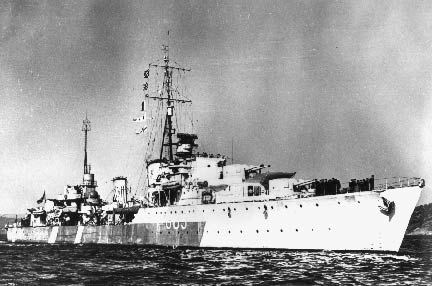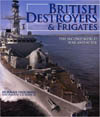
The destroyer HMCS Haida (G 63) of the Royal Canadian Navy.
Technical information
| Type | Destroyer |
| Displacement | 1,883 tons (2,559 full complement) BRT |
| Length | 377 feet (oa) |
| Complement | 190 (Cossack, Afridi, Somali and Tartar 219) men |
| Armament | 8 4.7" guns (4x2) 4 x 2pdr AA (1x4) 8 0.5" MG AA (4x2) 4 21" torpedo tubes (1x4) |
| Max speed | 36 knots |
| Engines | Geared turbines, 2 shafts |
| Power | 44000 HP |
| Notes on class | The Tribal class destroyers trace their roots to 1934 when the British Admiralty evaluated the threat posed by much larger destroyers being built in Japan, Italy and even Germany than the Royal Navy had. These ships were all around 2000 tons while the British destroyers were closer to 1300 tons. Estimated cost per ship was 340,000 pounds excluding Admiralty supplied armaments putting the average cost around 520,000. The Tribal was finally accepted after no less than 8 design proposals. The design chosen was a powerful yet beautiful looking ship. The first 7 Tribals were ordered on 10 March, 1936 with the latter group of 9 Tribals being ordered on 9 June. The ships were formed into the 1st and 2nd Tribal destroyer flotillas. By 1939 the Royal Navy had learned that while the Tribals were larger they were just normal destroyers. Thus the flotillas were renamed 4th and 6th destroyer flotillas. 8 ships were built for the Canadian Navy and the first of those came into service in 1943. (4 more Tribals were being built for the RCN but they would not see service until after the war). Australia built 3 Tribal class destroyers, which were commissioned into the RAN. The Tribals were not really U-boat hunters but rather fleet destroyers. During the second half of 1940 the Royal Navy ships (except the war losses HMS Gurkha and HMS Afridi) had one twin 4.7" gun turret replaced by a twin 4" AA gun turret. The Canadian and Australian ships carried this arrangement upon completion.
A Tribal class destroyer on display Pennant numbers were changed from F .. to G .. in late 1940 (in or around December). |
All ships of the Tribal class
| ||
| HMAS Arunta (I 30) | ||
| HMAS Bataan (I 91) | ||
| HMAS Warramunga (I 44) | ||
| ||
| HMCS Athabaskan (ii) (R 79) | ||
| HMCS Cayuga (R 04) | ||
| HMCS Nookta (R 96) | ||
| HMCS Athabaskan (i) (G 07) | Lost on 29 Apr 1944 | |
| HMCS Haida (G 63) | ||
| HMCS Huron (G 24) | ||
| HMCS Iroquois (G 89) | ||
| HMCS Micmac (R 10) | ||
| ||
| HMS Afridi (F 07) | Lost on 2 May 1940 | |
| HMS Ashanti (F 51) | ||
| HMS Bedouin (F 67) | Lost on 15 Jun 1942 | |
| HMS Cossack (i) (F 03) | Lost on 24 Oct 1941 | |
| HMS Eskimo (F 75) | ||
| HMS Gurkha (i) (F 20) | Lost on 9 Apr 1940 | |
| HMS Maori (F 24) | Lost on 12 Feb 1942 | |
| HMS Mashona (F 59) | Lost on 28 May 1941 | |
| HMS Matabele (F 26) | Lost on 17 Jan 1942 | |
| HMS Mohawk (F 31) | Lost on 16 Apr 1941 | |
| HMS Nubian (F 36) | ||
| HMS Punjabi (F 21) | Lost on 1 May 1942 | |
| HMS Sikh (F 82) | Lost on 14 Sep 1942 | |
| HMS Somali (F 33) | Lost on 20 Sep 1942 | |
| HMS Tartar (F 43) | ||
| HMS Zulu (F 18) | Lost on 14 Sep 1942 | |
| ||
See all Destroyer classes.
|
Tribal class ships hit by U-boats (3) | |||
| 24 Oct 1941 | HMS Cossack (i) | Sunk | U-563 |
| 17 Jan 1942 | HMS Matabele | Sunk | U-454 |
| 20 Sep 1942 | HMS Somali | Sunk | U-703 |
 British destroyers & frigates Norman Friedman |
Books dealing with this subject include:
|
